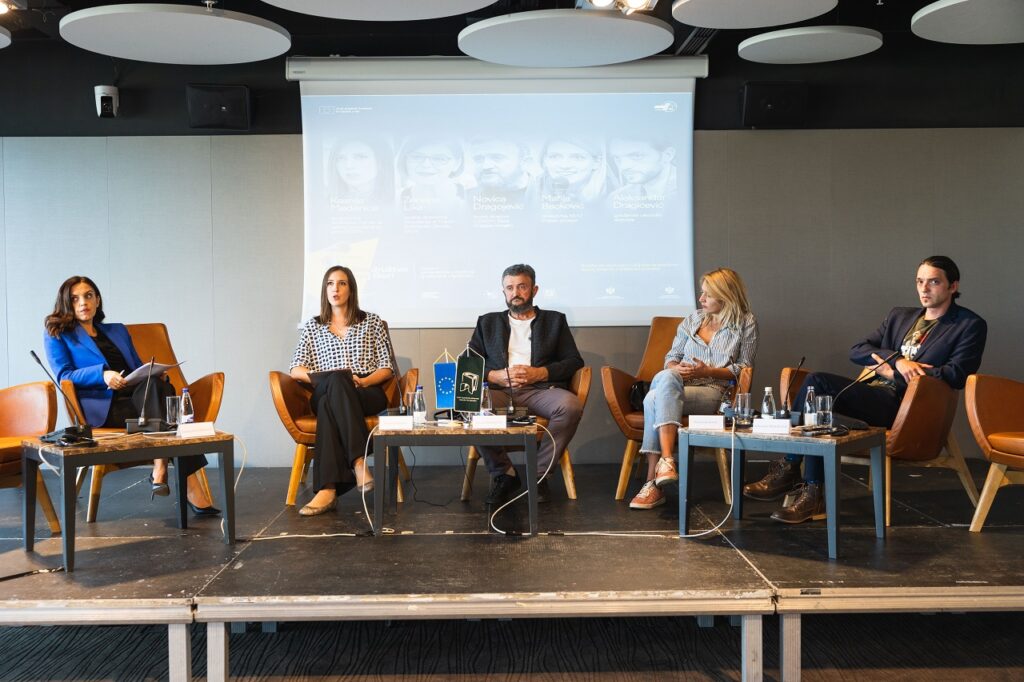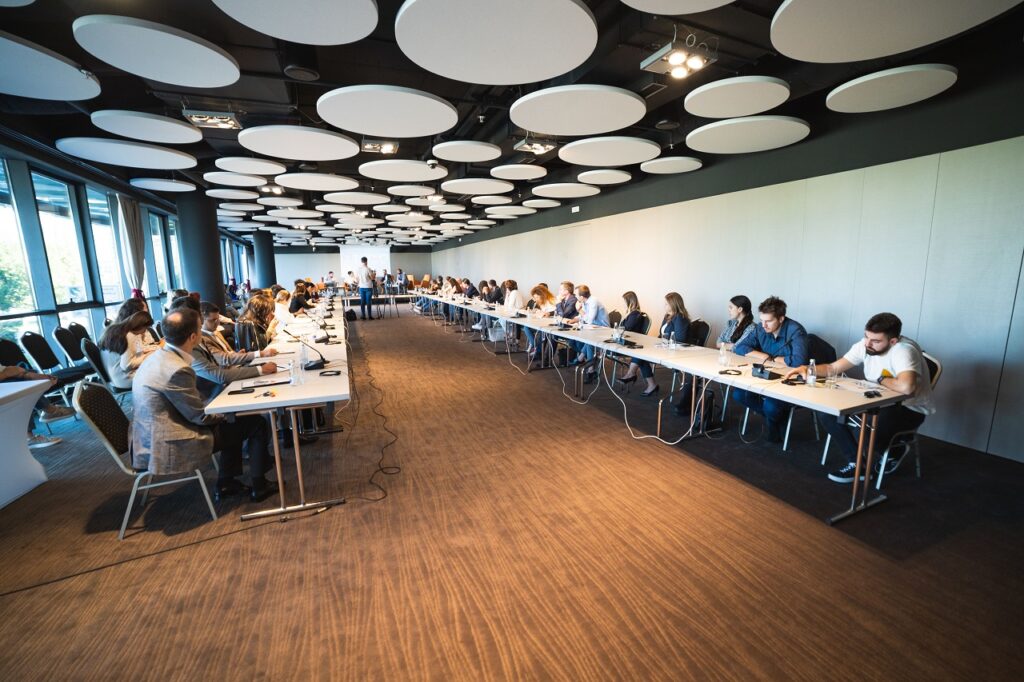You become an activist by realizing that there is no one and that if you do not do it, no one will. Civic activism is a serious job, it requires courage, optimism, time and will, and it does not just happen on the street, it is accented in the second panel “Civic activism and citizens’ engagement – development of local initiatives and movements“, today within the event “Civil Society in Montenegro – challenges and perspectives in the fight for civic values”, organized by the Centre for Civic Education (CCE) with partners, supported by the European Union and co-financed by the Ministry of Public Administration.
Ksenija Medenica, programme director at the Center for the Protection and Study of Birds (CZIP), emphasized how important it is to hear the voice of citizens and to have dissatisfaction expressed. Referring to the case of Solana in Ulcinj, she explained that at the beginning of every struggle we have a phase of denial by the competent institutions. “At that stage, one must remain determined, persistent and courageous and form a critical mass and alliances, in order to gain strength for concrete pressure and change. Today, the Ulcinj Solana is a protected area, which is the result of a campaign started by a few individuals 10 years ago.” She mentioned that we should not forget the importance of the so-called small initiatives, such as Ćemovsko polje, cypress in Bar, etc. and that these are examples that illustrate why civic activism and broader connections are important. When it comes to local activism, Medenica pointed out that the voice of local activists is heard much louder today, even though it is difficult to reach some people and change things, and that citizens take action when they feel endagered. “Civic activists must be optimistic, open to learn and willing to contribute. And for an effective contribution, it is important that we are all in it together, at the local level and with the support that comes from outside”, she stated. “Civic activism is a serious job and requires a lot of time and will. It is not something that happens only on the street, where it is heard the most, but it also happens at home, in the office, at coffee with friends, everywhere you have the opportunity to initiate a change“, concluded Medenica.
Novica Dragojević, Executive director of the Association for the Protection of Komovi (UZKOM), shared his experience and the experience of locals in the fight for the rivers Crnja, Crni potok and Ljubaštica in the municipality of Kolašin, stressing that the arrogant behavior was an impulse to start defence, without knowledge “what is hiding behind the hill“. He stated that the residents, who until then were in the passive role of observers, had awakened courage and the will to stand up and protect the natural good, not only in their area, but also in the area of the whole Montenegro. “According to our skill, knowledge and possibilities, we investigated and then found out the intention that all rivers of Komovi are to be put into a tube. The formed team unitedly and without personal interests, with the selfless support of non-governmental organizations, and especially the CCE, started to fight and with over 55 protests, suffering torture from public authorities, police, communal police, and even judicial authorities, reached the desired result,” said Dragojević. Referring to the problem of deforestation, he pointed out that there is an even more difficult battle ahead than for rivers and that not only flora and fauna are threatened, but the entire ecosystem. “Reactions and responses of the competent authorities – the Government, the relevant Ministry, the Environmental Protection Agency and the Forestry Administration – are not only worrying, but also pity and some authorities started to put pressure on citizens by depriving certain rights to citizens and making procedures more difficult,” he said. “We, as residents of that area, must mobilize and again the help of the wider community will be needed”, said Dragojević.
Marija Backović, director of the NGO Prazan prostor, whose programming is related to culture, emphasized the need for wider social engagement in support of civic activism. “We should all work to create new civic activists, those who will continue the fight for some of the things we are fighting for today. From generation to generation, it becomes evident that our education system is so bad that it kills any desire and motivation for young people to engage in some kind of activism”, she said. Backović said that she believes in changes, but also that the situation is alarming. “Regardless of their profile, we must keep young people and children in mind, think about them and constantly come up with activities that include them as well. In working with high school students, when it comes to rhetorical expression, there is a noticeable bad influence on young people from people who appear in the media and who are not good role models that young people imitate”, she stated. Backović assessed that young people can be much better because they have a passion for life, because they are at the point of waiting for great things and they must be given space and wind at their backs to ask and express their opinions and positions. “You cannot be a citizen without an active role. When it comes to children and young people, both at the local and national level, more should be done, and cultural politics, the development plan and programme and work at the national level must be more meaningful“, she said, warning also about the presence and dangers of cyber violence among young people.
“It is much easier to be a civic activist today than two years ago when they were faced with phenomena such as death threats, various types of harassment, institutional and non-institutional forms of pressure “, said Aleksandar Dragićević, a civic and environmental activist. “We should take advantage of the existing vacuum when the structures are weak and not allow the political elites to be the ones who will trample civic activism. Everything is possible if we use all available tools – if we have social networks, let’s find a way to use them, as well as human resources who know how to communicate,” he said. Reflecting on the impact of campaigns on social networks, Dragićević assessed that creating certain credibility on social networks also requires good communication. “There are not many of us, but we are a group of people – citizens, eco-activists, non-governmental sector, locals. You become an activist when you realize that there is no one, if you do not do it, no one will do it”, he stated. He illustrated that with the example of active citizens in the North who began to understand that something of theirs was endangered, and then looked at how to save it. “At the beginning, at the public debates no one came, while the authorities could do anything they imagined, and now they are slowly reaching even regular numbers of 300-400 people”, Dragićević pointed out.
The round table gathered over 70 participants from institutions, non-governmental organizations and international organizations.
The event is organized as part of the project CSOs in Montenegro – from basic services to policy shaping – M’BASE implemented by the CCE, in partnership with the German Friedrich Ebert Stiftung (FES), NGO Center for the Protection and Research of Birds (CZIP) and Politikon Network, in cooperation with the Ministry of Public Administration and Ministry of European Affairs of the Government of Montenegro. The project is financed by the European Union and co-financed by the Ministry of Public Administration.
Nikola Mirković, Programme associate


